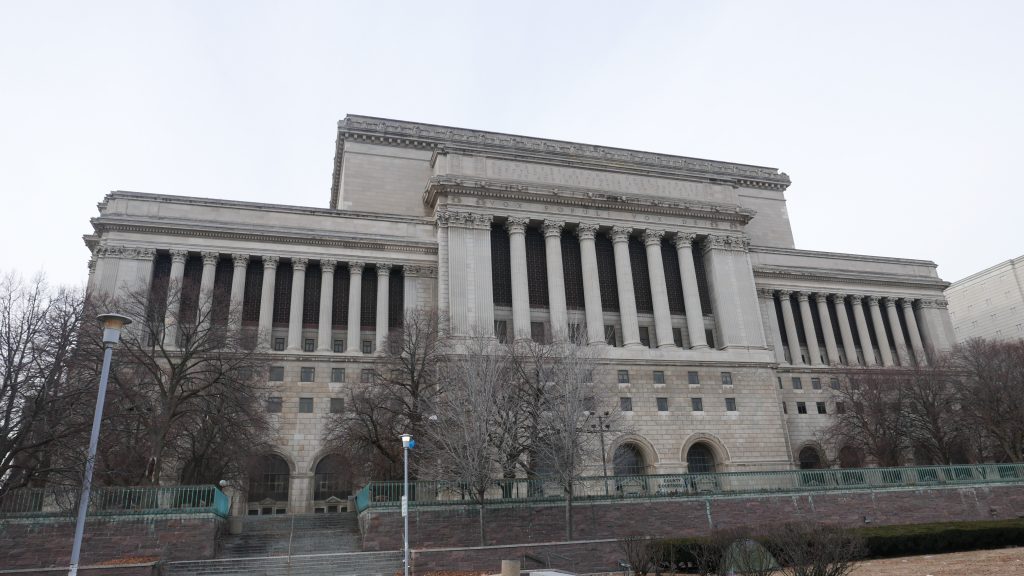Tight Budget Forces Difficult Vote on Housing, Juvenile Justice
Sup. Shawn Rolland wants $500,000 for a housing program. But his chosen source raises concerns for administration, colleagues.

Milwaukee County Courthouse. Photo by Graham Kilmer.
With federal pandemic funding waning, Milwaukee County policymakers are again faced with the tough decisions that were previously a hallmark of the county’s budgeting process.
Recently, rising homelessness in Milwaukee County reached a fever pitch when the Wisconsin Department of Transportation (WisDOT) announced it would close two park-and-ride lots along the freeways. The lots were being used for encampments by people experiencing homelessness.
Sup. Shawn Rolland was motivated by the event to try to find additional funding for homelessness programming in the 2025 budget. But it’s proving a challenge, as county officials are trying to be cautious with the funding given an uncertain future.
Rolland drew up an amendment that would take $500,000 out of a $1 million allocation set aside for potential cost increases associated with juvenile corrections and instead move it to a program run by the Housing Division. The county’s Department of Health and Human Services is a massive agency, accounting for approximately 50% of the annual budget. It includes the county’s Housing Division as well as the agency that oversees the youth justice system.
The funding would be used to expand the division’s flexible housing pool, which is the program housing officials said could offer the most help for the people living in the park and ride lots, Rolland told his colleagues during an Oct. 24 meeting of the board’s Committee on Finance. The division uses the program to lease apartments around the city that are used to quickly house people who are in crisis.
Homelessness and housing costs are both rising in Milwaukee, Rolland said, adding that he thinks the area is on the precipice of a “major housing crisis… And if we don’t have a counterbalance to that, then I think we will continue to see these park and rides [encampments] rise up,” Rolland said.
The problem, from the view of the administration and some of his fellow supervisors, is that the amendment could unintentionally hurt the county’s human services budget.
The state of Wisconsin is considering nearly doubling the daily rate it charges counties to incarcerate juveniles at state-run youth prisons like the Lincoln Hills School for Boys and the Copper Lake School for Girls.
Joe Lamers, director of the Office of Performance Strategy and Budget, noted that this isn’t the first time the state has considered a huge rate increase for youth incarceration. “Last time they approved it, and now they’re proposing it again to double it to this astronomical amount,” he said.
The state currently charges the county $1,268 per day for every juvenile incarcerated in a state prison. In September, the state announced plans to increase the daily rate by approximately 82% to $2,305. If the increase is ultimately approved, the state will end up charging the county $841,325 a year, DHHS Director Shakita LaGrant-McClain said,
LaGrant-McClain urged supervisors not to support Rolland’s amendment out of concern that the state will approve the increase. If the increase goes forward, it has the potential to send the entire department’s budget into the red.
“$1 million is really the kind of the floor that we’re anticipating, or the financial impact with that change could be as high as $4 million or more,” said Matt Fortman, DHHS fiscal administrator. ” It really just depends on the amount of kids that are sent to Lincoln Hills and Copper Lake.”
Rolland said he thought the board could approve funding for the housing program and revisit the budget for youth corrections later in 2025 when the state makes its decision on the daily rate. He also added that he thought circuit court judges should “strongly resist sending people to these institutions.”
The county and the courts have made significant progress over the last decade to lower the number of county youth held in state prisons. The county is currently building a $31.3 million, 32-bed facility that will allow the courts to sentence juvenile offenders to serve sentences in Milwaukee. The new facility will also expand a county program that offers an alternative to traditional incarceration, with shorter sentences and mental health services followed by community supervision.
However, the state runs the only Type 1 juvenile corrections facilities in the state. These facilities are where the courts send juveniles who have committed the most serious crimes, like homicide. A new state facility is being built in Milwaukee that would reduce the travel time to Lincoln Hills in central Wisconsin, but it will still require the county to pay the state.
“We have a number of youth right now who are pending serious charges,” LaGrant-McClain said. “We have no control over that.”
LaGrant-McClain agreed with the sentiment behind Rolland’s amendment and said that DHHS is prioritizing housing in 2025, including adding a staff person to a new housing subcommittee that will consider systemic causes of homeless and potential prevention. She said the $500,000 Rolland wants to shift to housing “will go very quickly.”
Rolland had a similar view of the money’s role in youth corrections, saying, “If things really go sideways here, $500,000 is only going to be part of the way to covering it.”
DHHS released a statement Thursday reporting that the agency had a record month in October for getting people off the street and into permanent housing.
The DHHS Housing Navigation team has successfully assisted 42 people in October in securing safe and stable housing, marking a significant achievement in Milwaukee County’s ongoing commitment to ending homelessness.
Rolland’s amendment failed at the Committee on Finance on Oct. 24 following a tie vote with Supervisors Juan Miguel Martinez and Anne O’Connor joining Rolland in support and supervisors Willie Johnson, Jr., Steve Taylor and Justin Bielinski voting in opposition. Rolland continued to advocate for the amendment and released a statement urging his colleagues to approve it when the board takes up the full budget.
“For those recently forced to leave local park-and-ride lots, this means contemplating living in the woods, under bridges, or other precarious places,” Rolland said. “This situation is a tragedy, and we must act to prevent it.”
UPDATE: Committee Resurrects, Passes Rolland Amendment
Rolland’s housing amendment was resurrected by the Committee on Finance Friday morning.
Chairwoman Marcelia Nicholson and Johnson Jr. offered an amendment that would make the juvenile corrections contingency funding available for emergency housing in the event it was not needed for payments to the state.
This prompted the committee to reconsider the issue raised by Rolland’s amendment a week earlier. Belinski successfully moved to have the committee reconsider Rolland’s amendment.
After some debate, Supervisors Sequanna Taylor, Rolland, Martinez, Bielenski and O’Connor were in the majority, with Johnson Jr. and Steve Taylor in the minority, on a vote that replaced the new amendment with the one Rolland previously submitted.
Lamers and LaGrant-McClain once again warned supervisors that the juvenile corrections charges pose a significant risk to the DHHS budget in 2025. If there are as many youth in state prisons next year as there were this year, and the rate increase is approved, DHHS will have to start cutting programming, they said.
Rolland pointed to the budget surplus the department is running for 2024 and said “it shows that there’s a way that we can do this.” Both Lamers and LaGrant-McClain noted that the surplus occurred because the number of youth in state corrections went down.
Sup. Steve Taylor told his colleagues that last year during budget season the board was still “on this high of COVID funding” and that supervisors would “need a reality check” as the county is projected to enter several years of increasing budget deficits.
“I understand the passion on this issue, but I think you need to listen what was just told to us,” he said.
However, Rolland’s amendment found strong support this time around, despite the financial warnings from county officials.
Sup. Sequanna Taylor, who was not present when Rolland’s amendment was voted down the first time, said it was an opportunity to “help those individuals today, not tomorrow.” Sup. Jack Eckblad shared the sentiment, saying the amendment was “putting money in the hands of the folks who are on the very front lines.” Sup. Caroline Gómez-Tom said it was “an attempt to do more with the limited resources we have here in. Milwaukee County.”
Bielinski, who changed his vote from a week ago, told Urban Milwaukee after the meeting, “Ultimately for me it came down to the fact that while the county can find $500k when it needs to, those facing homelessness don’t have the luxury of time, and we can’t afford to wait til late next year to see what’s left over.”
The board will vote on the amendment again when it considers the full 2025 budget on Nov. 7.
If you think stories like this are important, become a member of Urban Milwaukee and help support real, independent journalism. Plus you get some cool added benefits.
More about the 2025 Milwaukee County Budget
- MKE County: New Report Shows Lower Deficit for 2025 Budget - Caleb Rose - Apr 23rd, 2025
- MKE County: Crowley Signs 2025 Budget Without Vetoes - Graham Kilmer - Nov 13th, 2024
- County Executive Crowley, Chairwoman Nicholson Approve 2025 County Budget - County Executive David Crowley - Nov 13th, 2024
- MKE County: North Point Parking Lot Could Be Finished by Summer - Graham Kilmer - Nov 11th, 2024
- MKE County: Board Quickly Adopts 2025 Budget - Graham Kilmer - Nov 7th, 2024
- Milwaukee County Board Advances 2025 Budget Focused on Upstream Services - County Board Chairwoman Marcelia Nicholson - Nov 7th, 2024
- Milwaukee DSA Supports County Finance Committee’s Right To Counsel Funding Amendment - Milwaukee Democratic Socialists of America - Nov 4th, 2024
- MKE County: Supervisors Move to Create Civilian Review Board for Sheriff - Graham Kilmer - Nov 3rd, 2024
- MKE County: Tight Budget Forces Difficult Vote on Housing, Juvenile Justice - Graham Kilmer - Nov 1st, 2024
- Transportation: MCTS Will Hire Its Own Personnel For Security - Graham Kilmer - Oct 29th, 2024
Read more about 2025 Milwaukee County Budget here
More about the Lincoln Hills and Copper Lake Facilities
- Evers’ Prison Plan Receives Mixed Reviews - WPR Staff - Feb 21st, 2025
- ‘First of its Kind in Wisconsin’ Collaboration Will Support Disabled Incarcerated Youth - Andrew Kennard - Dec 12th, 2024
- MKE County: Tight Budget Forces Difficult Vote on Housing, Juvenile Justice - Graham Kilmer - Nov 1st, 2024
- Letters from Evers, Republicans Show Clash on Juvenile Corrections - Andrew Kennard - Aug 17th, 2024
- Following Counselor Death, Staff, Family Plead for Help At Lincoln Hills - Andrew Kennard - Aug 16th, 2024
- Lawmakers Grill Wisconsin Prison Officials Over Safety, Employee Death at Youth Facility - Sarah Lehr - Aug 7th, 2024
- Future of Lincoln Hills Remains In Limbo - Isiah Holmes - Apr 12th, 2024
- MKE County: County Youth In State Prisons Declining Again - Graham Kilmer - Jan 15th, 2024
- Legislative Committee Okays $6 Million for 2nd Juvenile Facility - Devin Blake - Oct 1st, 2023
- Some Progress, Still Problems at Lincoln Hills - Isiah Holmes - Jul 9th, 2023
Read more about Lincoln Hills and Copper Lake Facilities here
MKE County
-
New Pickleball Courts Open at West Milwaukee Park
 Nov 1st, 2024 by Graham Kilmer
Nov 1st, 2024 by Graham Kilmer
-
Parks Fundraising Campaign Raises $530,000 Far Faster Than Expected
 Oct 31st, 2024 by Graham Kilmer
Oct 31st, 2024 by Graham Kilmer
-
Ribbon Cutting on New Lyons Park Playground
 Oct 31st, 2024 by Graham Kilmer
Oct 31st, 2024 by Graham Kilmer





















